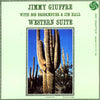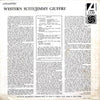



Jimmy Giuffre with Bob Brookmeyer & Jim Hall - Western Suite
Jimmy Giuffre (clarinet, tenor saxophone, baritone saxophone) [click here to see more vinyl featuring Jimmy Giuffre]
Jim Hal (guitar) [click here to see more vinyl featuring Jim Hall]
Bob Brookmeyer (trombone)
Composed and arranged by Jimmy Giuffre
1 LP, standard sleeve
Original analog Master tape : YES
Heavy Press : 180g
Record color : black
Speed : 33 RPM
Size : 12'’
Stereo
Studio
Record Press : Unspecified
Label : Pure Pleasure Records
Original Label : Atlantic
Recording : December 3, 1958, Atlantic Studios, NYC and Lenox, MA, by Heinz Kubicka, Herb Kaplan, and Tom Dowd
Production: Nesuhi Ertegun
Originally released in 1960
Tracks :
Side A :
- Pony Express
- Apaches
- Saturday Night Dance
- Big Pow Wow
Side B :
- Topsy
- Blue Monk
Reviews :
« Pure Pleasure has decided to tackle a difficult target with this excellent release. Giuffre started out as a swing band saxophone player who developed into a. avant-garde artist best known for his clarinet playing-not exactly a formula for big record sales. Giuffre came out of the cool jazz left coast tradition to play with a shifting group of like-minded improvisation artists, including Paul Bley, Steve Swallow, and Jim Hall. They were at their apex in the early 1960s with a string of releases on Verve and Columbia. He had recently began touring with a rhythm-less group, replacing Pena with a trombonist Bob Brookmeyer.
The trio plays quiet, haunting music that, is not as challenging as Giuffre’s masterpiece Free Fail , three years in the future, is also more approachable. Sounding redolent of ECM sound, the ambiguous instrumental timbres signal a freedom from jazz’s strictures of the 1950s and a direction that still sounds modern and familiar more than a half century later. Pure Pleasure’s 180-gram reissue, mastered by Ray Staff at Air Mastering, presents a nice stereo image, better than average for 1958." The Ear by Jason Kennedy November 2015
« In late 1957, jazz saxophonist, clarinetist, composer, and iconoclast Jimmy Giuffre broke up the original Jimmy Giuffre 3 with Ralph Pena and Jim Hall. In early 1958, for a recording session, he formed a new trio without a rhythm section. For the album Trav'lin' Light, his new trio included Hall on guitar and the underrated trombone giant Bob Brookmeyer. For a year, they gigged together up and down the West Coast and played summer festivals, recorded, and even played clubs in New York. They became a trio of adventurous musicians for whom form was not an obstacle to creativity. As the year wound down, Giuffre wanted to document the trio once more, sensing its life was coming to an end. He composed the four-movement "Western Suite" with the trio's strengths in mind, as a way of documenting how they had come together as a band during that year. The piece itself stands as a crowning achievement in a career that included discovering the talents of Steve Swallow and Paul Bley and making the truly revolutionary recording Free Fall for Columbia three years later. The roots of that thinking lie in this set. Jim Hall's playing was dark, funky, ambiguous, sounding like drums and voices all at the same time -- particularly in the fourth movement. Brookmeyer became the pace setter. His lines were played as stage settings for the other two players to dialogue and narrate against. Giuffre, ever the storyteller, advanced the improvisation angle and wrote his score so that each player had to stand on his own as part of the group; there were no comfort zones. Without a rhythm section, notions of interval, extensions, interludes, and so on were out the window. He himself played some of his most retrained yet adventurous solos in the confines of this trio and within the form of this suite. It swung like West Coast jazz, but felt as ambitious as Copland's Billy the Kid. The record is filled out with two other tunes, one of Eddie Durham's, "Topsy," and the final moment of mastery this band ever recorded, the already classic "Blue Monk." The easy stroll of the front line with Brookmeyer's trombone strutting New Orleans' style is in sharp contrast to Giuffre's clarinet playing. Which carries the bluesy melody through three harmonic changes before he solos and then plays three more. Hall keeps it all on track, and somehow the piece sounds very natural this way, though unlike "Monk," there are no edges here -- everything is rounded off. This is as solid as any of the earlier or later Jimmy Giuffre 3 records, and two notches above Trav'lin' Light in that it reveals a fully developed sense of the responsibilities, possibilities, and freedoms of reinventing jazz for the trio. » AllMusic Review by Thom Jurek
Ratings :
Allmusic : 4 / 5 , The Ear by Jason Kennedy : Recording 8/10 Music 9/10


